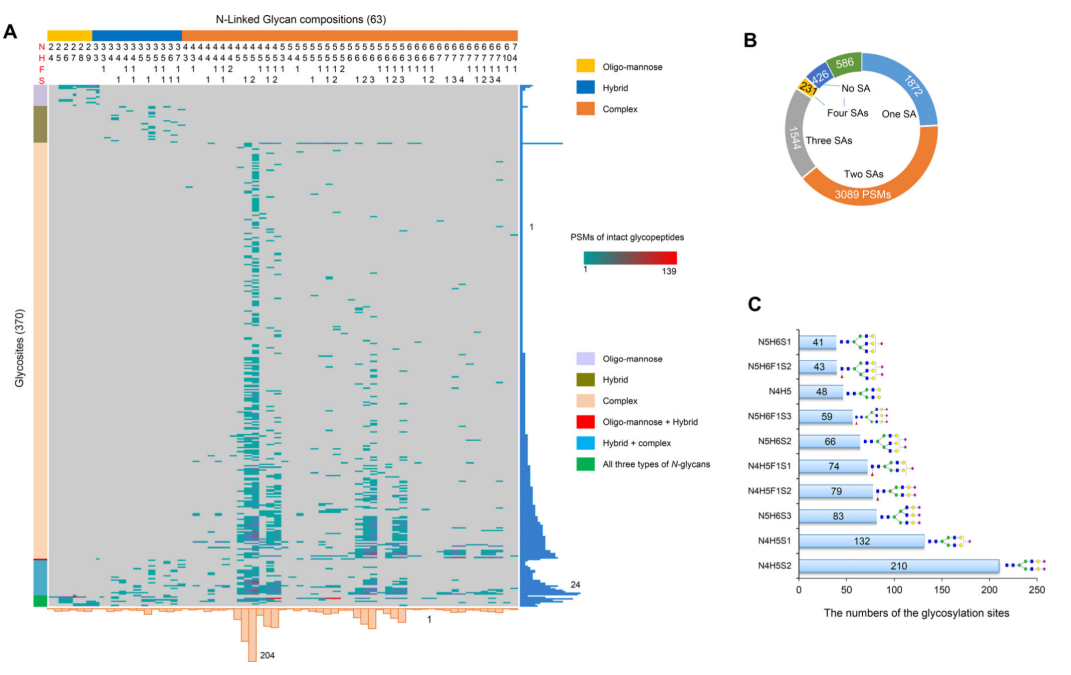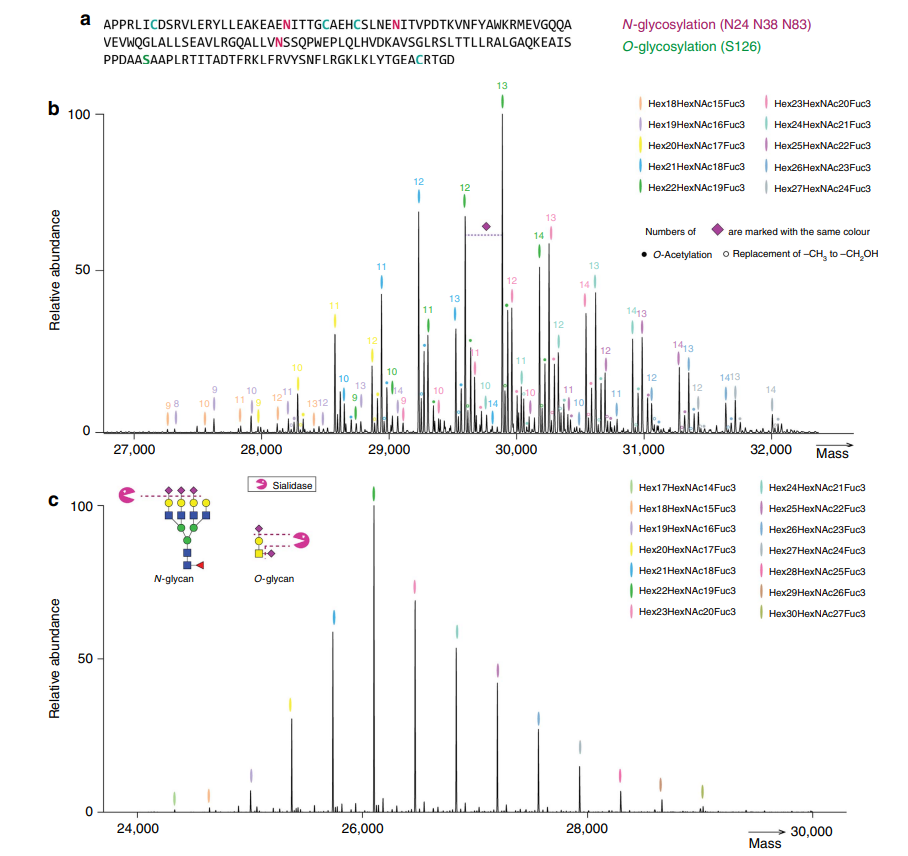Glycoprotein Profiling Service
Glycoprotein profiling is the systematic analysis of glycoproteins to identify their structures, glycosylation sites, and functional roles in biological systems. By leveraging advanced techniques such as mass spectrometry, protein electrophoresis, and immunoblotting, glycoprotein profiling provides comprehensive insights into the diversity and complexity of glycoproteins. This analysis is essential for understanding their involvement in critical processes such as cell signaling, immune regulation, and molecular recognition.
Glycoprotein profiling is crucial for addressing challenges in biomedical research, including uncovering disease biomarkers, understanding pathophysiological mechanisms, and developing targeted therapeutics. It can solve problems such as identifying glycosylation-related abnormalities, elucidating glycan-mediated interactions, and optimizing biopharmaceutical glycoproteins for enhanced efficacy and safety. This makes glycoprotein profiling an indispensable tool in advancing precision medicine and therapeutic innovations.
Services at MtoZ Biolabs
At MtoZ Biolabs, we leverage cutting-edge mass spectrometry to deliver glycoprotein profiling service that enables precise examination of glycan structures and their biological roles. Our service ranges from identifying glycoproteins to analyzing glycosylation sites, enhancing the development of therapeutic proteins and biosimilars.

Figure 1. The Workflow of Glycoprotein Analysis Service by MtoZ Biolabs
Service Advantages
1. Comprehensive Coverage: We employ both top-down and bottom-up approaches to provide extensive glycoprotein analysis, from broad structural overviews to detailed molecular insights.
2. Advanced Technologies: Our state-of-the-art mass spectrometers and bioinformatics tools ensure high accuracy and reliability in our analyses.
3. Efficiency: Our standardized workflows and quick data processing ensure timely project delivery.
4. Customization: We tailor our glycoprotein profiling service to meet the specific research needs of our clients, providing targeted support for unique challenges.
Case Study
1. Site-Specific Profiling of Serum Glycoproteins Using N-Linked Glycan and Glycosite Analysis Revealing Atypical NGlycosylation Sites on Albumin and α-1B-Glycoprotein
This study presents an integrated approach combining high-resolution native mass spectrometry (MS) and middle-down proteomics to analyze the micro-heterogeneity of biopharmaceutical products. Using human erythropoietin and the plasma protein properdin as models, the method successfully bridges the gap between peptide-based and protein-based mass spectrometry analyses, achieving the most comprehensive glycoprotein profiling. Through this strategy, three novel C-glycosylation sites on properdin were identified, along with unexpected heterogeneity in C-mannosylation occupancy. Additionally, the study developed a biosimilarity scoring system to quantitatively evaluate structural similarity in proteins, applicable to therapeutic proteins and biomarkers. The glycoprotein profiling service employs advanced mass spectrometry techniques to analyze glycoprotein structures and heterogeneity comprehensively, aiding research and development across various applications.

Sun, S. et al. Anal Chem. 2018.
Figure 2. Site-Specific Glycosylation Profiling of Human Serum Glycoproteins
2. Hybrid Mass Spectrometry Approachesin Glycoprotein Profiling
This study introduces an integrative approach combining high-resolution native mass spectrometry and middle-down proteomics to analyze structural micro-heterogeneity in glycoproteins caused by post-translational modifications (PTMs). Using human erythropoietin and properdin as models, the approach bridged peptide- and protein-based mass spectrometry platforms, providing comprehensive glycoprotein profiling. It identified three novel C-glycosylation sites on properdin and revealed unexpected heterogeneity in C-mannosylation occupancy. Additionally, a biosimilarity score was developed to quantitatively assess structural similarity across protein sources, with potential applications for therapeutic proteins and plasma biomarkers. Glycoprotein profiling service employs advanced mass spectrometry techniques to comprehensively characterize glycoprotein micro-heterogeneity, including detailed analysis of post-translational modifications, enabling precise structural assessment and profiling of therapeutic and plasma proteins.

Yang, Y. et al. Nat Commun. 2016.
Figure 3. Native MS Analysis of rhEPO
Applications
1. Biopharmaceutical Development
Our glycoprotein profiling service enhance the safety and efficacy of drugs by providing in-depth glycoprotein insights during drug development.
2. Biomarker Research
Our glycoprotein profiling service help uncover disease mechanisms and potential therapeutic targets through advanced glycoprotein analysis.
3. Scientific Research
Our robust technical support empowers basic research, enriching the understanding of glycoproteins in biological systems.
FAQ
Q1: Is it possible to perform glycoprotein profiling using animal tissues?
Answer: Glycoprotein profiling can indeed utilize animal tissues as samples, as glycoproteins are widely present in animal cells and tissues, playing vital roles in biological functions. Analyzing glycoproteins in animal tissues can help researchers better understand their roles in organisms, such as in cell signaling, immune responses, and cell adhesion. When performing glycoprotein profiling, proteins must first be extracted from animal tissues. Specific methods such as mass spectrometry, protein electrophoresis, and immunoblotting can then be employed to identify and analyze glycoproteins. These methods enable researchers to determine the types of glycoproteins, glycosylation sites, glycan structures, and other critical information. Additionally, when using animal tissues for glycoprotein profiling, it is important to consider the freshness and handling of the samples, as these factors may influence the properties of glycoproteins and the reliability of analytical results.
Deliverables
1. Comprehensive Experimental Details
2. Materials, Instruments, and Methods
3. Relevant Liquid Chromatography and Mass Spectrometry Parameters
4. The Detailed Information of Glycoprotein Profiling
5. Mass Spectrometry Image
6. Raw Data
With our specialized expertise and extensive experience, MtoZ Biolabs stands as a leading choice for global researchers and biopharmaceutical companies seeking comprehensive glycoprotein profiling service. For more information or to discuss your specific needs, please reach out for a detailed consultation.
How to order?







